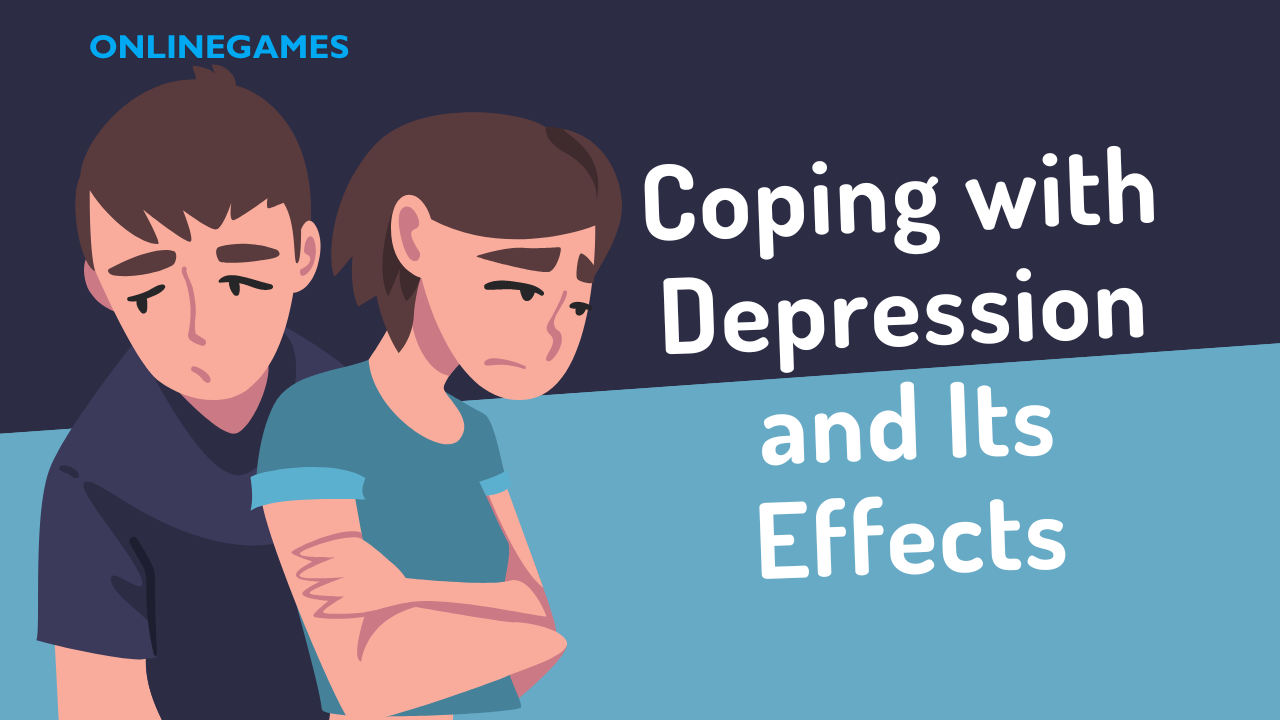Depression is a pervasive mental health disorder that affects millions of individuals worldwide. It is characterized by persistent feelings of sadness, hopelessness, and a lack of interest or pleasure in activities. The effects of depression can be debilitating, impacting every aspect of an individual’s life, including physical health, relationships, and overall quality of life. Understanding how to cope with depression and mitigate its effects is crucial for improving mental well-being and fostering a path to recovery.
Understanding Depression and Its Symptoms
Defining Depression
Depression is more than just a transient feeling of sadness; it is a serious mood disorder that affects how a person thinks, feels, and handles daily activities. Major Depressive Disorder (MDD), often simply referred to as depression, involves a consistently low mood and loss of interest in activities for at least two weeks, alongside other symptoms that interfere with everyday functioning.
Common Symptoms of Depression
Individuals with depression may experience a range of symptoms, including:
- Persistent sadness or a low mood
- Loss of interest or pleasure in activities once enjoyed
- Changes in appetite and weight (either gain or loss)
- Sleep disturbances, such as insomnia or oversleeping
- Fatigue or a lack of energy
- Difficulty concentrating, making decisions, or remembering
- Feelings of worthlessness or excessive guilt
- Thoughts of death or suicide
These symptoms can vary in intensity and duration, significantly affecting an individual’s ability to function in daily life.
The Impact of Depression on Daily Life
1. Physical Health Consequences
Depression is closely linked to various physical health issues, including chronic pain, heart disease, and a weakened immune system. Individuals with depression often experience a range of somatic symptoms such as headaches, digestive problems, and muscle pain, which can exacerbate their overall condition.
2. Effects on Relationships
Depression can strain relationships with family, friends, and colleagues. The symptoms of depression, such as irritability, withdrawal, and a lack of communication, can lead to misunderstandings and conflicts. This isolation can further deepen feelings of loneliness and exacerbate the symptoms of depression.
3. Work and Academic Performance
Depression significantly impacts an individual’s ability to concentrate, make decisions, and perform tasks efficiently. This can lead to decreased productivity at work or school, absenteeism, and a decline in overall performance, creating additional stress and pressure.
4. Mental Health and Cognitive Function
Depression is associated with cognitive impairments, including difficulties with memory, attention, and executive function. These cognitive deficits can affect problem-solving abilities and the capacity to cope with stress, further hindering recovery.
Coping Strategies for Managing Depression
1. Seek Professional Help
Therapy and Counseling: Professional therapy, such as cognitive-behavioural therapy (CBT) or interpersonal therapy (IPT), can be highly effective in treating depression. These therapies help individuals identify and change negative thought patterns, improve coping skills, and develop strategies to manage symptoms.
Medication: Antidepressant medications can be prescribed to help manage the chemical imbalances in the brain associated with depression. Common classes of antidepressants include selective serotonin reuptake inhibitors (SSRIs) and serotonin-norepinephrine reuptake inhibitors (SNRIs). It is important to consult with a healthcare provider to determine the most appropriate medication and dosage.
2. Build a Support Network
Connect with Loved Ones: Maintaining strong connections with family and friends provides emotional support and helps to combat the isolation often associated with depression. Sharing feelings and experiences with trusted individuals can provide comfort and perspective.
Join Support Groups: Participating in support groups offers an opportunity to connect with others who understand and share similar experiences. Support groups can provide valuable insights, encouragement, and a sense of community.
3. Practice Self-Care
Engage in Regular Exercise: Physical activity has been shown to improve mood and reduce symptoms of depression. Exercise releases endorphins, which are natural mood lifters, and can also help reduce stress and improve sleep.
Adopt a Healthy Diet: A balanced diet rich in fruits, vegetables, lean proteins, and whole grains supports overall health and can positively impact mood and energy levels. Avoiding excessive sugar and processed foods helps to maintain stable blood sugar levels and reduce mood swings.
Prioritize Sleep: Quality sleep is essential for mental health. Establishing a regular sleep routine, creating a comfortable sleep environment, and avoiding stimulants such as caffeine and electronic devices before bed can improve sleep quality and reduce depressive symptoms.
Practice Mindfulness and Relaxation Techniques: Techniques such as mindfulness meditation, deep breathing exercises, and progressive muscle relaxation can help reduce stress, improve emotional regulation, and enhance overall well-being.
4. Set Realistic Goals
Break Tasks into Manageable Steps: Setting small, achievable goals can help to reduce feelings of overwhelm and build a sense of accomplishment. Breaking larger tasks into smaller steps makes them more manageable and less daunting.
Focus on Progress, Not Perfection: It is important to recognize and celebrate small victories and improvements, rather than striving for perfection. Focusing on progress helps to build confidence and maintain motivation.
5. Limit Stress and Overcommitment
Manage Time Effectively: Effective time management can help reduce stress by allowing individuals to prioritize tasks and avoid over-commitment. Planning and organizing activities can help create a sense of control and reduce the pressure of looming deadlines.
Learn to Say No: Setting boundaries and learning to say no to additional responsibilities or social engagements can help prevent burnout and ensure that time and energy are reserved for self-care and essential activities.
6. Engage in Enjoyable Activities
Pursue Hobbies and Interests: Engaging in activities that bring joy and satisfaction can help to improve mood and reduce symptoms of depression. Whether it’s reading, painting, gardening, or playing a musical instrument, finding time for enjoyable activities is crucial for emotional well-being.
Explore New Experiences: Trying new activities or learning new skills can provide a sense of achievement and boost self-esteem. It also offers an opportunity to meet new people and expand one’s social network.
Long-Term Strategies for Managing Depression
1. Develop Coping Mechanisms
Identify Triggers: Understanding the specific triggers that contribute to depressive episodes can help individuals develop strategies to manage or avoid them. Keeping a journal to track mood changes and associated events or thoughts can provide valuable insights.
Practice Resilience Building: Developing resilience involves building the capacity to cope with and recover from adversity. Strategies such as maintaining a positive outlook, practising gratitude, and seeking opportunities for growth and learning can enhance resilience.
2. Maintain a Healthy Lifestyle
Regular Physical Activity: Engaging in regular exercise not only supports physical health but also improves mood and reduces anxiety. Activities such as walking, swimming, or yoga can be particularly beneficial.
Balanced Nutrition: A nutritious diet supports overall health and mental well-being. Ensuring adequate intake of essential nutrients, such as omega-3 fatty acids, B vitamins, and magnesium, can help manage symptoms of depression.
Consistent Sleep Routine: Maintaining a consistent sleep schedule and ensuring adequate rest is vital for mental health. Good sleep hygiene practices, such as keeping a regular bedtime and creating a restful sleep environment, are essential.
3. Foster Positive Relationships
Build Strong Social Connections: Maintaining healthy relationships and a supportive social network is crucial for emotional well-being. Regularly spending time with loved ones and participating in social activities can provide emotional support and reduce feelings of isolation.
Practice Effective Communication: Open and honest communication with friends, family, and healthcare providers is important for expressing needs and seeking support. Effective communication helps to foster understanding and strengthen relationships.
4. Stay Informed and Educated
Learn About Depression: Understanding the nature of depression, its symptoms, and treatment options can empower individuals to take an active role in their recovery. Staying informed about new research and treatment approaches can provide additional strategies for managing the condition.
Seek Professional Advice: Regular consultations with healthcare providers and mental health professionals can ensure that treatment plans are effective and tailored to individual needs. Seeking professional advice for any changes in symptoms or treatment options is important for maintaining mental health.
Embracing a Path to Recovery
Coping with depression requires a multifaceted approach that includes professional help, self-care, and the support of a strong social network. By understanding the symptoms and impact of depression, individuals can take proactive steps to manage the condition and improve their quality of life. Implementing strategies such as seeking professional therapy, building a support network, practising self-care, and maintaining a healthy lifestyle can help reduce the effects of depression and foster a path to recovery. Remember, managing depression is an ongoing process, and taking small, consistent steps can lead to significant improvements in mental health and overall well-being.










